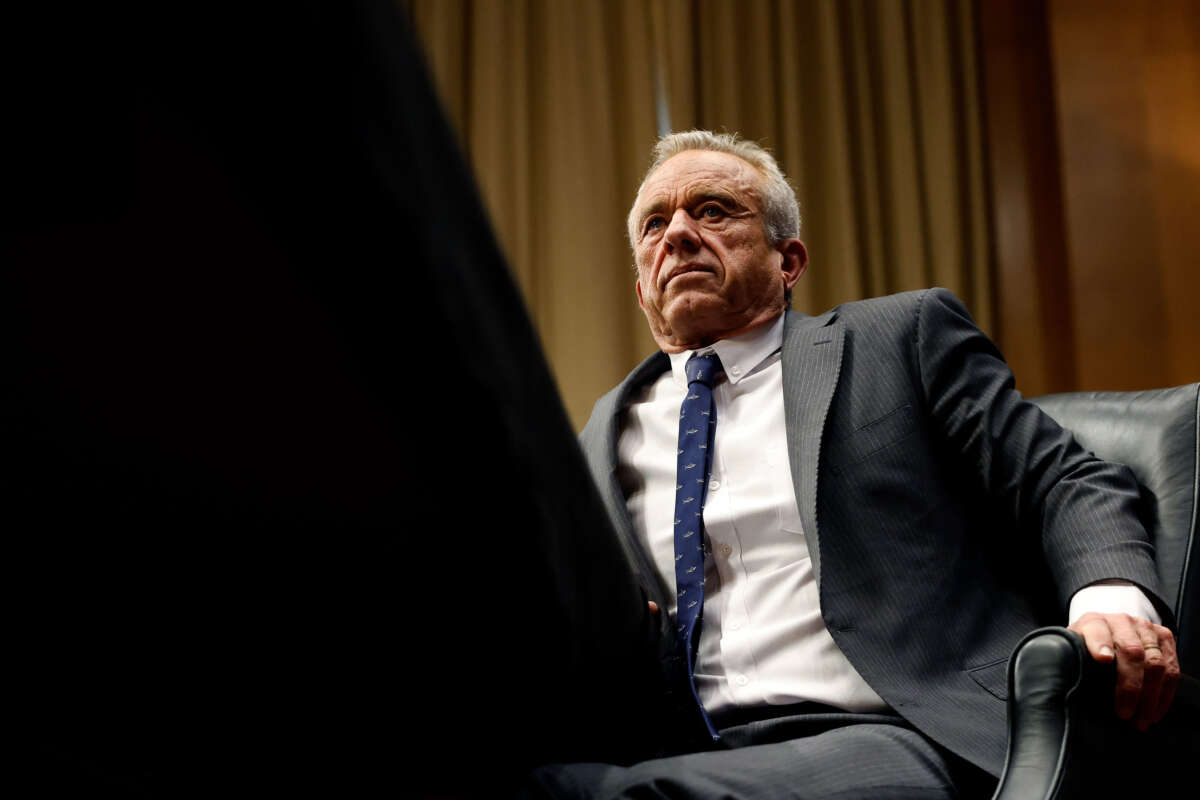Did you know that Truthout is a nonprofit and independently funded by readers like you? If you value what we do, please support our work with a donation.
A committee within the U.S. Senate narrowly voted to advance the nomination of Robert F. Kennedy Jr., a noted conspiracy theorist who has advanced disinformation on the efficacy and safety of vaccines, to become the next secretary of the Department of Health and Human Services (HHS).
The 14-13 vote in the Senate Finance Committee came only after a skeptical Republican, Sen. Bill Cassidy of Louisiana, said he was assured by the Trump administration that vaccine promotion would remain an important aspect of the department’s work, despite countless examples of Kennedy peddling falsehoods regarding vaccines in the past.
Cassidy was a doctor himself before becoming a U.S. senator. His decades of work in Louisiana hospitals included the creation of a program to offer free vaccines to schoolchildren in the state.
Yet Cassidy was able to overlook Kennedy’s alarming falsehoods after the White House reached out to him, he said, “seeking to reassure me regarding their commitment to protecting the public health benefit of vaccination.”
“My expectation that we can have a great working relationship, to make America healthy again, is the basis of my support,” Cassidy added.
Other Republicans who voted to advance Kennedy’s nomination to a full Senate vote also expressed concerns about his statements on vaccines, but said they weren’t enough to make them vote against his nomination.
“The only way that Bobby Kennedy and I will get crosswise is if he does actually take a position against the safety of proven vaccines,” Sen. Thom Tillis (R-North Carolina) said.
Despite the White House’s assurances, President Donald Trump posted debunked anti-vaccination views on social media the very same morning as the vote for Kennedy.
“20 years ago, Autism in children was 1 in 10,000. NOW IT’S 1 in 34. WOW! Something’s really wrong,” Trump wrote in a Truth Social post, adding, “We need BOBBY!!!”
Scientists have long recognized that increasing rates of autism diagnoses over the past several decades are largely the result of growing awareness and changes in diagnostic criteria — and that vaccines have nothing to do with it.
Advocates for autism and neurodiversity acceptance also note that autism is not something to be “cured” or prevented.
“Everybody seems to think they know what autism is — and everybody seems to agree that it’s a bad thing,” freelance writer Jodie Hare, author of “Autism Is Not a Disease: The Politics of Neurodiversity,” wrote in a Substack post in 2021.
Hare added:
Treating autism as a ‘disease’, rather than a neurotype that exists as a result of natural biological variation, paves the way for a level of discrimination and stigmatisation that would not be acceptable if it were applied to other minority groups. … The proliferation of knee-jerk assumptions about autistic people – the idea that we are inherently wrong, rather than just different — is stopping non-autistic people from making an effort to engage with us and hindering the building of a world where autistic people would be valued members of society, safe from harm and free from isolation.
“Every autistic person is deserving of a life — a life where we’re valued, just as we are,” Hare concluded.
Media that fights fascism
Truthout is funded almost entirely by readers — that’s why we can speak truth to power and cut against the mainstream narrative. But independent journalists at Truthout face mounting political repression under Trump.
We rely on your support to survive McCarthyist censorship. Please make a tax-deductible one-time or monthly donation.
